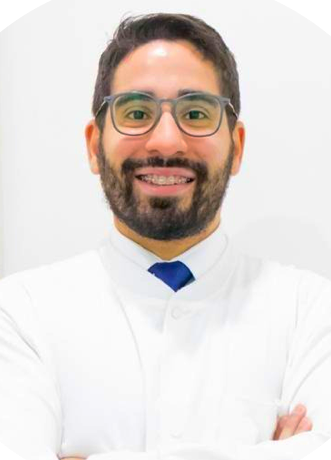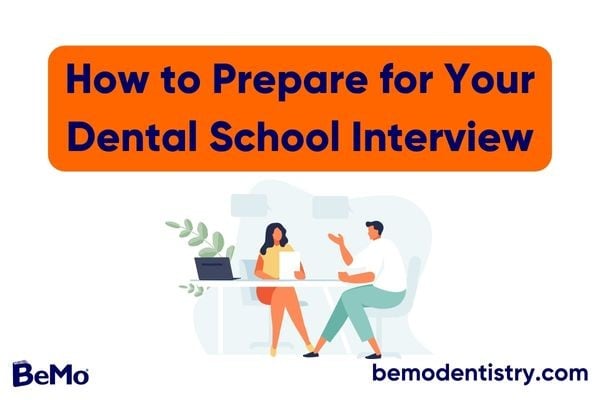How to prepare for a dental school interview is a concern of every dental school hopeful. Getting an invite to an interview at one of your top dental schools is a turning point in the application process to be celebrated, so how can you prepare for this opportunity? Read this article to get expert insights!
>>Want us to help you get accepted? Schedule a free initial consultation here <<
Listen to the blog!
How to Prepare for a Dental School Interview
Start Early
If you took the advice of the ADEA and applied early (submitted your application in June, July, or August), you might be pleasantly surprised by an invitation to interview sooner than you expected. It is always recommended that you prepare early to boost your chances by engaging intentionally in the application and interview process, reflecting on dentistry, researching schools thoroughly, and considering questions for interviewers. Early submission is key for consideration, especially with rolling admissions policies.
Work with an Expert
Importantly, you must not rush your interview prep. If you feel uneasy, aren’t sure how to proceed, or simply want to maximize your chances of success, it’s worth considering working with a dental school advisor. A professional can help you with every step of the application process, from advising you on what to highlight among your dental school extracurriculars to recommending what to include in your dental school personal statement.
In fact, one of our own dental consultants only wishes she had received help when she was an applicant:
“I wish I had help applying to dental school. I did everything on my own and had no idea what I was doing or how to stand out. Now that I am an Academic Consultant, I feel lucky that I even got into dental school at all! My application could have been so much stronger if I had guidance.” – Amanda Thompson, General Dentist, Case Western Reserve University
When it comes to interview prep, dental school admissions consulting services are even more valuable, as you will be faced with a range of interview types, depending on the school, and knowing how to deal with them will boost your knowledge and confidence. Crucially, interview simulations in the form of mock medical school interviews will teach you strategies for answering any type of question and managing anxiety.
Dress the Part
Whether participating in your interview virtually or in-person, you must dress professionally. The attire will be much the same as what to wear to a medical school interview.
Plan for Expenses
You should factor in interview fees and travel expenses by budgeting ahead; costs may vary depending on the schools that invite you, so estimate based on the maximum potential expenses if every school on your list requires a visit or charges a fee.
What to Expect from a Dental School Interview
Interviews allow admissions committees to learn more about you, your background, your dental school application experiences, and your interest in dentistry while also more thoroughly evaluating your application.
During dental school interviews, your interpersonal skills, understanding of healthcare challenges through ethics questions, and fit with the school will be evaluated, allowing you to ask questions to ensure compatibility. Taking the time to understand the interview purpose and process and to anticipate the questions that may be asked is the next major step in how to prepare for your dental school interview. The more you know, the better you can leverage that knowledge to improve your performance and clinch that coveted spot at your preferred school.
Who Are the Interviewers?
Dental school interviewers, typically faculty members, may also include alumni or current students, who may conduct interviews or provide insights into the school, lead tours, or offer perspectives on admissions decisions, occasionally accompanied by admissions staff or student representatives.
How Is the Interview Set Up?
Prepare for varying interview formats by strategizing for each type, whether in-person or online, ensuring readiness with a reliable computer system or travel plan respectively, and proactively researching each school's interview structure beforehand.
Dental school interviews use either open or closed file approaches.
In open file interviews, evaluators have access to your AADSAS dental school application and may delve deeper into your background, while closed file interviews require you to provide a comprehensive introduction to your experiences. It's best to prepare as you would for a closed file interview, equipped with all the information you wish to convey.
For more information on the specific requirements of virtual dental school interviews, you can review the ADEA AADSAS Virtual Dental Schools Dos and Don’ts pamphlet, which provides handy tips in an easy-to-read format on important elements to consider before, during, and after your dental school interview.
How Long is a Dental School Interview?
The interview duration does vary depending on the school and type of interview, but you can count on a minimum of 30 minutes for traditional interviews and longer than this for multiple mini-interviews (MMIs), or combined interview types that might include more than one activity, such as an interview plus Q&A with current students.
If you are faced with an unconventional structure and don’t know exactly what is required of you in each part, reach out to the school for clarification; you do yourself a disservice by presenting for a day on campus with only a vague sense of what to expect.
Dental School Interview Types
Often referred to as the “one-on-one” interview, this type of interview is between one evaluator and one candidate and usually lasts about 30 minutes. With an average interview response being 3 minutes, or less, you should be able to answer several questions – anywhere from 5 to 9 or more, depending on how long it takes to respond to each one and whether the interviewer asks any follow-up questions.
Questions That May Be Asked in Your Dental School Interview
The American Dental Education Association (ADEA) lists the following questions that are likely to be asked in a dental school interview:
- Tell me about yourself.
- Why do you want to be a dentist?
- What are your strengths? What would you like to improve on?
- What have you done to improve your manual dexterity?
- What research, volunteer, or leadership experiences have you had?
- Where do you see yourself in 5 or 10 years?
- Why this dental school?
- Who is the most influential person (people) in your life?
- Tell us about your experiences shadowing or observing in a dental environment. What did you like or dislike most?
Remember, it’s important that you answer genuinely and show your authentic passion (and confidence) during your interview. For instance, if you had a very specific epiphany or event happen in your life that led you to this path, you should strive to integrate it into your response to questions such as “Why do you want to be a dentist”:
“When I was a child, my dentist had a wall of Polaroid pictures of children after their first dental visit. The wall consisted mostly of crying faces. If you searched the wall for my photo, you were met with a huge smile and a double thumbs up. I imagine that when I got that photo taken, my fate was set!” – Amanda Thompson, General Dentist, Case Western Reserve University
And/or, if asked about your shadowing, you might wish to draw on (or elaborate on) specific details of your experience:
“I shadowed a general dentist and an oral surgeon. I loved seeing how the general dentist moved seamlessly from appointment to appointment, each different from the last. I enjoyed seeing the technical aspects of oral surgery. It amazed me that it took more time to administer the anesthesia than it did to extract four wisdom teeth. Seeing these providers in their element made me want to combine science, art, and connection even more!” - Amanda Thompson, General Dentist, Case Western Reserve University
FAQs
1. How do I become a dentist?
To become a dentist, complete a bachelor's degree, meet prerequisites, engage in extracurriculars, pass the DAT, and complete dental school, which typically takes eight years in total.
2. What type of interview is used by dental schools?
Dental schools use various interview formats, including one-on-one, panel, MMI, and group interviews.
3. What are some of the most common dental school interview questions?
Common dental school interview questions cover personal background, motivations for dentistry, program selection, ethical dilemmas, and current dental topics.
4. How should I prepare for a dental school interview?
Prepare for dental school interviews by arranging fees and travel, ensuring tech compatibility, acquiring professional attire, reviewing your application, reflecting on strengths, and participating in mock interviews.
5. How long are dental school interviews?
Dental school interviews typically last from 30 minutes to one hour, depending on the format.
6. What do I do if I don’t know the answer to a question?
If unsure about a question during an interview, remain calm, analyze the question, and articulate your thought process, utilizing strategies learned during mock interviews.
7. What resources are available to help with dental school interview preparation?
Resources for dental school interview preparation include mock interviews, online forums, and guidance from qualified consultants and academic advisors.
8. Is the interview process for Canadian schools different than the one for American schools?
The interview processes for Canadian and American dental schools are generally similar, with variations based on individual institutions rather than regional differences.

